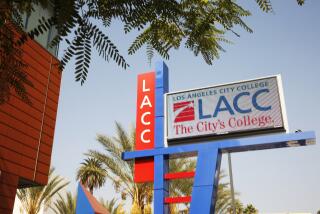Biologist Returns to UC Irvine With Bundle for Mosquito Research : Grants: He’s one of the few promising young scientists who has managed to win much-coveted funds. The money can be the key to a productive career.
- Share via
IRVINE — Anthony James has come home. And he’s brought with him $195,000 a year in research grants for his work on the genetics of mosquitoes at UC Irvine.
The 38-year-old UCI-trained molecular biologist who left prestigious Harvard University last September is one of the increasingly rare people among the nation’s promising young scientists who has managed to win much-sought-after research dollars.
Capturing such all-important grants often can mean the difference between important breakthroughs and the demise of promising careers, UCI officials say. Some of James’ colleagues have seen their proposals rated highly, but not funded as ever more researchers compete for limited funds.
In fact, it took four tries during a difficult two-year period before James won his $95,000-a-year grant from the National Institutes of Health to find a way of genetically altering mosquitoes so they couldn’t harbor agents of diseases such as malaria and yellow fever.
Had Harvard’s School of Public Health not had private foundation support to provide seed money for initial research, James said, he doubts he could have nabbed the three-year NIH grant, which kicked in last September.
“If you don’t have the development money like we did, you can’t do the work,” James said.
In January, James also received a MacArthur Foundation grant of $100,000 a year for the next two years.
Together, the research grants make it possible for James and seven associates to devote all of their time to eradicating diseases such as malaria, which alone kills 1 1/2 million children each year and threatens 400 million people, most below the Equator.
A genetic approach to combatting the disease is crucial because pesticide spraying has resulted in mosquito strains that are now immune.
“There are places in Thailand now where if you get malaria, you’re dead,” James said. “Not only are the mosquitoes resistant, but the actual parasites (that cause the disease) have become resistant to the therapeutic drugs.”
Not all mosquitoes are capable of transmitting diseases, however. So James and fellow researchers reasoned that there must be some genetic component in those varieties that are naturally immune to the disease-causing host, which in malaria is a single-celled protozoan called plasmodium.
“There’s sort of a gee-whiz aspect to it, but we thought, if that’s true, then maybe it would be possible to change mosquitoes that transmit the human disease into ones that don’t,” he said.
James, one of only two black biological science professors at UCI, started his career at the university in 1969, mainly as a means to avoid being drafted for the war in Vietnam.
Once at UCI, however, the student from La Mirada realized that in four years he would have a degree, and that it might as well be in a field he enjoyed. He had begun working as a bottle washer in UCI’s biology laboratory, and “got turned on” by watching and performing experiments.
“They decided my talents were being wasted washing bottles,” he joked.
James went on to get his doctoral degree at UCI in 1979 and then did two postdoctoral fellowships, the second of which evolved into a job at Harvard.
James, who now lives in the University Hills development on campus, said he decided to return to UCI because of the pre-eminence of the university’s molecular biology department, the fact that at an expanding University of California campus he was more likely to get research support and would qualify for tenure more quickly.
“I saw this as opportunity to be able to do my science and to work in a growing university that wants to be the premiere university in Southern California,” he said.






